

Most ebook files are in PDF format, so you can easily read them using various software such as Foxit Reader or directly on the Google Chrome browser.
Some ebook files are released by publishers in other formats such as .awz, .mobi, .epub, .fb2, etc. You may need to install specific software to read these formats on mobile/PC, such as Calibre.
Please read the tutorial at this link: https://ebookbell.com/faq
We offer FREE conversion to the popular formats you request; however, this may take some time. Therefore, right after payment, please email us, and we will try to provide the service as quickly as possible.
For some exceptional file formats or broken links (if any), please refrain from opening any disputes. Instead, email us first, and we will try to assist within a maximum of 6 hours.
EbookBell Team

4.3
78 reviewsIn a 2012 article published by The Washington Post’s “Answer Sheet” section, curated by
Valerie Strauss, John G. Maguire decries the failure of college writing students and their
instructors. The article, “Why So Many College Students Are Lousy at Writing—And How Mr.
Miyagi Can Help,” explains that many students “enter college as lousy writers—and … graduate
without seeming to make much, if any, improvement.” The problem? College writing classes
don’t teach good writing. The article scorns those writing courses which cover “rhetorical
strategies, research, awareness of audience, youth civic activism—everything except the
production of clear sentences.”
Maguire’s article advocates for a return to old-school instructional methods—specifically,
teaching style and mechanics so that college grads can produce clear, readable sentences.
Maguire concludes with a reference to a 1984 film, The Karate Kid. (If you haven’t seen it, the
film is an underdog story about an outcast teenager learning martial arts from a caring but
mysterious karate master, Mr. Miyagi.) Maguire asserts, “I’m a teacher, and I know what Mr.
Miyagi did — he tricked the kid into learning. He got him to do important behaviors first, and
didn’t reveal where they fit into the overall skill until later.” He continues,
[Colleges] should offer new writing courses that assume students know nothing
about sentences and train new sentence behaviors from the ground up. Be
repetitive and tricky—fool the kids into doing the right thing. Create muscle
memory. Think “wax on, wax off.” The kid’s goal was to win the karate contest.
The student writer’s goal should be mastery of the readable style.
So, according to Maguire, more teachers should “trick” students into learning grammar and
style, only to reveal to the students at some faraway time that they knew how to write all
along.
In case you can’t already tell, I am very resistant to this article. I introduce it not because I have
an axe to grind, but rather because I find it demonstrates essential misconceptions about
writing that many people share. I have taken to teaching this text on the first day of class to
show my students what they’re up against: teachers, readers, parents, The Washington Post
reporters, and many, many others who assume that (a) there is one “correct” kind of writing,
and (b) today’s students have no idea how to execute it